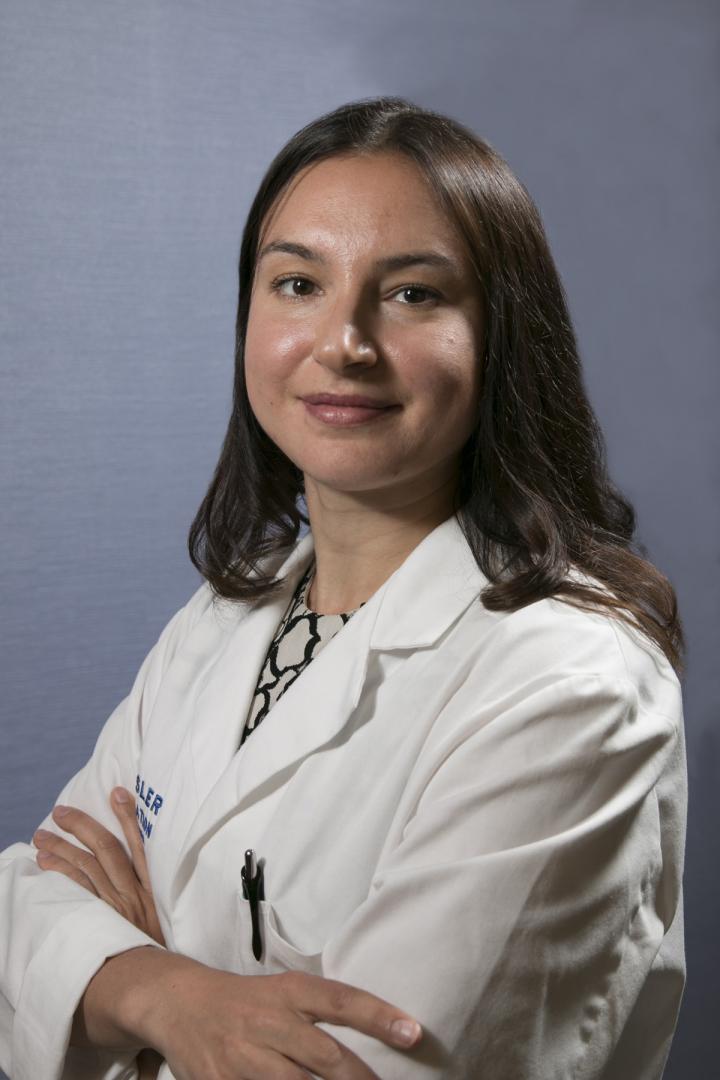Stroke rehabilitation researchers test new electrical stimulation therapy for improving for hand function after stroke, as part of multi-site study headed by the MetroHealth System and Case Western Reserve University

Credit: Kessler Foundation/Jody Banks
East Hanover, NJ. November 26, 2019. Kessler Foundation is participating in a phase II multi-site study of an innovative treatment to improve hand function in stroke survivors. Olga Boukrina, PhD, research scientist in the Center for Stroke Rehabilitation Research, is the site’s principal investigator. The study is funded through a five-year $3.2 million grant from the National Institutes of Health awarded to the principal investigator, Jayme S. Knutson, PhD, director of Research and associate professor of Physical Medicine and Rehabilitation at the MetroHealth System and Case Western Reserve University.
This is the first multi-site clinical trial of contralaterally controlled functional electrical stimulation (CCFES), a new rehabilitation intervention for hand recovery following stroke developed by Knutson and colleagues. With CCFES, electrical stimulation is applied to the muscles of the weak hand through surface electrodes, causing the weak hand to open, a function that is often lost in stroke survivors. The patient controls the stimulation to their weak hand through a glove with sensors worn on their opposite, unaffected hand. Opening their unaffected hand delivers a proportional intensity of electrical stimulation that opens their weak hand, and enables them to practice using their hand in therapy. Researchers will enroll 129 patients who are 6 to 24 months post stroke who have upper extremity hemiparesis and limited hand movement.
The effectiveness of CCFES will be compared with two other treatments — cyclic neuromuscular electrical stimulation (CNMES), which has pre-set duration and intensity of stimulation and operates independent of patient control, and traditional task-based training without stimulation. Participants will be randomly assigned to one of the three treatment options for 12 weeks. The research teams will administer the treatments and conduct blinded outcome assessments. The durability of functional improvements will be evaluated at 6-month follow-up. Study sites include the MetroHealth System (Jayme Knutson, PhD), the Cleveland Clinic (Ela Plow, PT, PhD), Emory University (A.M. Barrett, MD), and Johns Hopkins University (Preeti Raghavan, MD).
“Because hand function is integral to so many activities of daily living, advances that improve function can have significant effect on the lives of stroke survivors,” said Dr. Boukrina. “This study will help determine the optimal method for restoring hand function. We anticipate that putting the patients in control of stimulating their weak hand with CCFES may activate neuroplastic changes that lead to greater and longer lasting functional gains.”
###
Funded by National Institutes of Health, National Institute of Child Health and Human Development (1R01HD092351-01A1); ClinicalTrials.gov Identifier: NCT03574623
About Kessler Foundation
Kessler Foundation, a major nonprofit organization in the field of disability, is a global leader in rehabilitation research that seeks to improve cognition, mobility and long-term outcomes, including employment, for people with neurological disabilities caused by diseases and injuries of the brain and spinal cord. Kessler Foundation leads the nation in funding innovative programs that expand opportunities for employment for people with disabilities.
Learn more by visiting http://www.
Stay Connected
Twitter | http://www.
Facebook | http://www.
YouTube | http://www.
Instagram | http://www.
iTunes & SoundCloud | http://www.
Contacts
Carolann Murphy, PA; 973-324-8382; [email protected]
Rob Gerth, 973.323.3675; [email protected]
Media Contact
Carolann Murphy
[email protected]
973-324-8382




